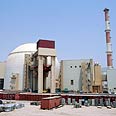
Iran strike? Just say no
Op-ed: Decision on whether to strike Iran must remain in the hands of Western powers
As expected, the terror regime in Gaza continues to constitute an open, bleeding wound for Israel. Yet according to media reports, Defense Minister Barak, who failed in handling the Hamas rule in Gaza, seeks to engage in bigger issues. The Gaza Strip is a minor issue for him. He has his sights set on Iran and the nuclear bomb threat, and Prime Minister Netanyahu is there with him. The situation reached the point where former Mossad Director Meir Dagan felt the need to openly warn against this dangerous move.
We must repeatedly stress that Israel must not carry out an overt strike against Iran. The issue is complex and the risks are so great that Israel cannot assume them. There is no similarity whatsoever between the strikes on Iraq’s and Syria’s nuclear reactors and the problems inherent in an Iran strike.
The strikes on both the Iraqi and Syrian reactors were undertaken with complete surprise. Neither the regime in Iraq nor the one in Syria imagined that such strike is to be expected. Yet the situation in Iran is different. Not only is Iran much more remote than Iraq and Syria, the Iranians have been preparing for a long time now for the possibility that their nuclear facilities could come under attack.
Even if a certain element of surprise can be achieved in an expected strike, the risk to the striking force is clearly much greater than what it was in Iraq and in Syria. The extent of the disaster inherent in the possibility of Israeli soldiers dying on Iranian soil requires no elaboration.
Yet other immense risks exist. There is a high probability that Iran would respond by directing missile barrages at Israeli cities and at vital facilities. Such attacks could be supplemented by missiles from the Gaza Strip and from Lebanon. In addition, Iran borders the Strait of Hormuz, which is used when transporting the oil of many states, including Saudi Arabia, Kuwait, Bahrain an Iraq. Overall, a significant portion of the global oil consumption goes through there.
Israel to be blamed
How will the Iranians respond to an Israeli strike? Will they settle for targeting Israel or will they aim to disrupt the global oil supply, either by operating in the Strait of Hormuz or by targeting regional oil faculties or states where the oil is produced? Such act would prompt oil prices to skyrocket and create a global crisis that would greatly worsen the current economic crisis. Israel would of course be blamed and viewed as a source of danger for the whole world.
We can imagine the various scenarios that could stem from such developments and wonder what America’s response would be to an Iran strike and whether the United States would agree to see Israel dragging Washington into a war it does not seek.
One thing is clear. Israel cannot afford to assume all the risks inherent in a direct military operation against Iran. The decision on this matter must remain in the hands of Western powers.
For Israel, the way to cope with the Iranian threat is to adopt indirect routes, by supporting tougher sanctions against Iran and also by securing an agreement with the Palestinian Authority that would minimize regional tensions.
We should also make note of the following: One of the effective ways (which was available to Israel) to indirectly harm Iran was to remove the Gaza Strip terror regime, which is premised on Iranian support. Such move, even without curbing the Iranian bomb directly, would have greatly undermined Tehran’s status and its ability to harm Israel. Yet the defense minister made sure that the opportunity to undertake such move is missed.
- Follow Ynetnews on Facebook
- Receive Ynetnews updates directly to your desktop










